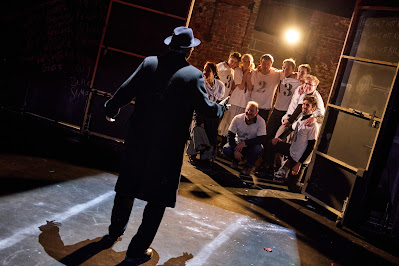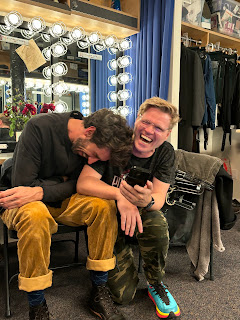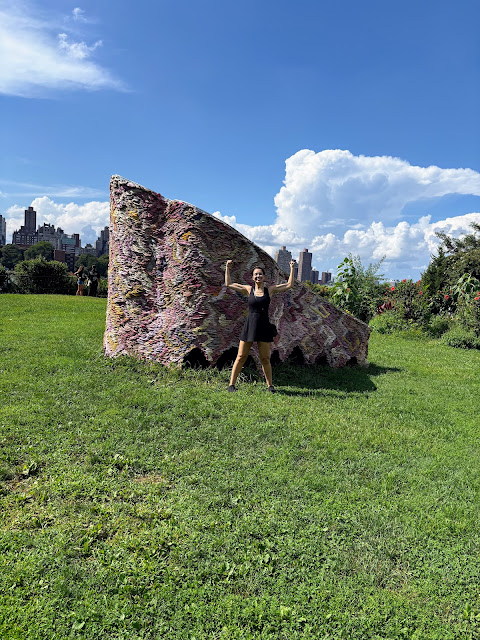This piece is a more detailed account of a specific negative talk-back that occurred, and is continuation from more universal theatre talk back experiences. For those thoughts, Part 1: is HERE.
Helpful background
Now, as for what happened tonight after The Merchant of Venice.
The producers advertised this particular evening as "Pride Night—" and
welcomed the audience to stay to discuss the themes of "Othering" in
society, the play itself and in our production.
For those who may not be familiar with the piece, a quick background:
The Merchant of Venice
is a play written around 1594 by William Shakespeare and listed as a
"comedy." The play centers around three main protagonists who are all
"Others" in the hetero-normative, Christian, male society of Venice:
Antonio is a queer man, Portia is a woman, and Shylock is a Jew. The
play has long been considered extremely controversial for the portrayal
and ultimate fate of it's "comic villain" Shylock-- who goes after the
Christian Antonio (whom he despises for his blatant bigotry of Jews) in
court when he fails to meet their iron-clad money-lending agreement
promising that should Antonio fail to meet the terms, Shylock may exact
"a pound of flesh" from Antonio, ostensibly killing him (for he has
Antonio's heart in mind).
Yet,
despite Shylock's legal "correctness," Portia—dressed as a man and
serving as the loophole-finding lawyer for the case—Antonio is spared,
and ultimately stripped of his property and life, only to be saved in
the end if he agrees to give up all his worldly goods and, of course, be
converted to Christianity.
My
take: Honestly? It is a play about some rather horrible people doing
some truly horrible things. And along the way there are some great
laughs, fun subplots, and some of Shakespeare's most iconic and
beautiful poetry and prose.
In short: it's complicated.
Our Production
Now MoV
has much more than Jewish themes— it also has the othering of women and
LGBTQ+ people. Not to mention the total lambasting of countless
nationalities and cultures in the smaller parts of the original text.
Our
production—for better or for worse, not my call—eliminated the queer
themes utterly, which I felt was a missed opportunity. It also largely
diminished my role as Portia and did little to illuminate her lack of
agency, her blinding intelligence, her loneliness and really any
redeemable part of her humanity. (I
hear you asking and yes, sure: it wasn't my favorite take on this play,
and not my favorite acting experience, but I'm not in charge. That's
the deal we sign as actors! Sometimes an actor has to trust, commit fully
to a director's vision as an instrument of and extension of their
artistic expression and suppress one's own preconceived notions and
ideas. That's the gig. And globally: I applaud anyone for taking a bold
"swing" and really trying something).
With
these two arms of the triumvirate diminished, our production did,
however, focus almost exclusively on Shylock: on ancient and
contemporary Antisemitic tropes, on the way we treated Jews then, and
continue to today.
Tonight
After
the show, we sit down, a moderator is present and highly qualified to
speak on the subject of the evening, but does not have journalistic
credits. They do not set any ground rules, they do not create a
"container" for how this is going to go. I am immediately concerned
because the subject matter is so intense, and it is obvious that
audience members are experiencing high emotions.
An
older man took up an enormous amount of airtime speaking for over 5
minutes about his background as a Eastern European Jewish immigrant,
then proceeded to express his "disappointment and outrage" at our
production. He used inflammatory language. He was clearly angry and
directing a great deal of his anger in my direction.
I
interrupted him (as politely as possible) in minute 5, noting that no
one else—not the moderator nor the producer—was putting an end to a
speech that was clearly going off course. I stated calmly that I "didn't
hear a question." He replied, impassioned:
"How can you do this?"
It went downhill quickly from there.
I won't get in to the minutia of his words, I will ask you to trust that this was not a conversation,
and his comments and his tone were inappropriate. His feelings are of
course, valid, but there is an appropriate audience, time, place and
manner in which to express them. And my feelings were valid: it was
perfectly reasonable to become defensive when asked—as an actor—to
personally "defend" a production I did not direct or produce.
It
needed to be shut down long before it was dealt with. And there was no
need for it to ever arrive at such a confrontational place to begin
with, had infrastructure been in place.
I will own my part: I became defensive, in my fear and anger I "puffed:" I rattled off facts, figures and basically barfed
the encyclopedia at on onto these men— to prove something. My
intelligence, my worthiness of respect; to show that they had
underestimated and belittled me? I don't know exactly. I'm still
figuring it out in the aftermath. I was also defending myself because I
felt unsafe! No one was stepping in and meaningfully coming to our aid! I
was terrified that there was no infrastructure in place from our
moderator or producers to help the exposed actors navigate this moment.
As the conflict escalated, both ushers and audience members left.
But
where the conversation turned ugly for me was when this man, and
another older man sitting beside him (also outraged) vociferously
attempted to "teach" me—not the men—about Jewish history. They
spoke directly to me, looked me in the eyes and used demeaning language
to do so. I believe used tone and language that insinuated that I was
too young, too goyishe, and too female to possibly understand the nuances of 5000 years of Jew-hatred.
So, allow me to be clear, gentlemen:
1. I am Jewish.
I understand that I may not "look Jewish" you.
Your assumption of my exclusion says more about you than it does about me.
2. Yes, I am a woman.
I
understand that 10 minutes ago, I was dressed in nothing more than a
pink bikini (and looking ravishing-by the way) and that possibly leads
you to believe that I am an intellectual lightweight whose beauty is her
only asset. But my attractive, apparently "youthful," hyper feminine
woman-ness makes me NO less capable of academic rigor, dramaturgy,
context, nuance, curiosity, or for a deep and secure grasp upon my
Peoples' history, Theatrical history and of history itself.
Just because I am a beautiful woman does not mean I am a stupid one.
Do
not assume that you "must" "TEACH ME" anything. (Yes, sir, I am
speaking to you who felt it necessary to teach me about The Rothschilds
in front of an audience.)
3. Censorship is a society-killer.
Also?
Yes, this play is officially a "comedy" and yes, it is problematic. But
to quote Professor James Shapiro author of "Shakespeare and The Jews"
“I
have tried to show that much of the play's vitality can be attributed
to the ways in which it scrapes against a bedrock of beliefs about the
racial, national, sexual, and religious difference of others. I can
think of no other literary work that does so as unrelentingly and as
honestly. To avert our gaze from what the play reveals about the
relationship between cultural myths and peoples' identities will not
make irrational and exclusionary attitudes disappear. Indeed, these
darker impulses remain so elusive, so hard to identify in the normal
course of things, that only in instances like productions of this play
do we get to glimpse these cultural fault lines. This is why censoring
the play is always more dangerous than staging it.”
In essence: we must be willing to see.
Censorship in art achieves nothing.
4. Producers and Moderators, please protect your actors and creatives.
This
is a professional engagement. We might love our work, but a labor of
love is still labor. And our time, safety and dignity should be
respected by implementing safeguards before and during audience
engagements. It is respectful. To all.
5. Never assume: onstage and off.
Finally, this talk-back revealed through it's "failure" precisely the reason we were gathered:
The
assumptions we make about Others based on a myriad of preconceived
beliefs, prejudices and assumptions. I—like millions—exist at the
cross-section of many identities. None of them should be questioned,
tested, proven, explained or even educated-about against my consent.
Particularly in a public forum.
We are, all of us, capable of prejudice, bigotry, rage and hatred.
Equally, we are, all of us, capable of great compassion, empathy, curiosity and courage.
I welcome you to—whenever possible- align yourself with the latter.
Take care of yourselves, your communities and one another.
And to all a good night.



































